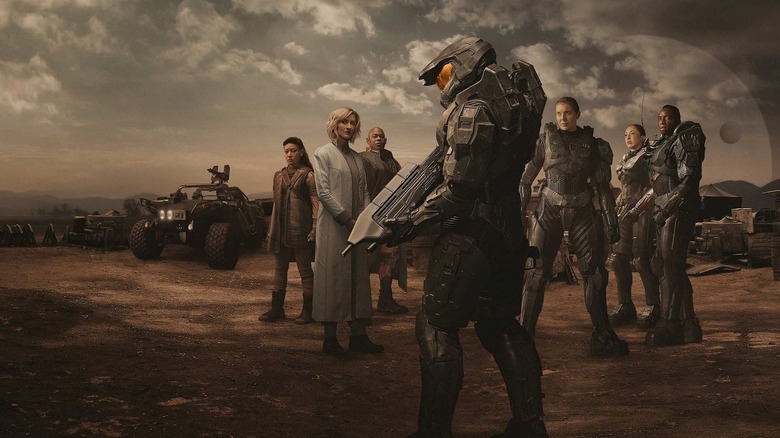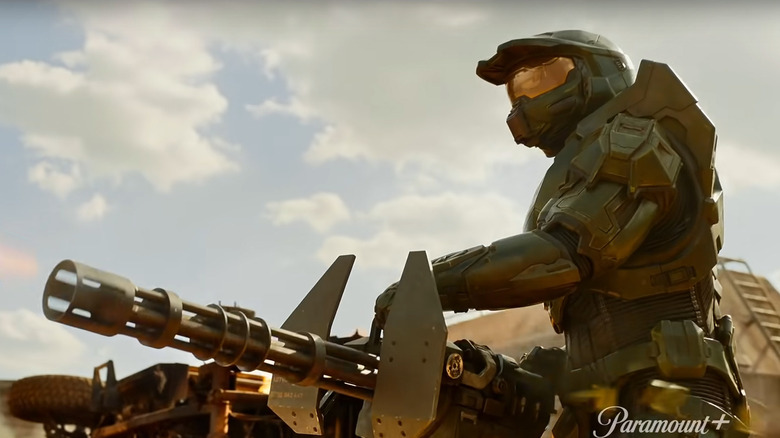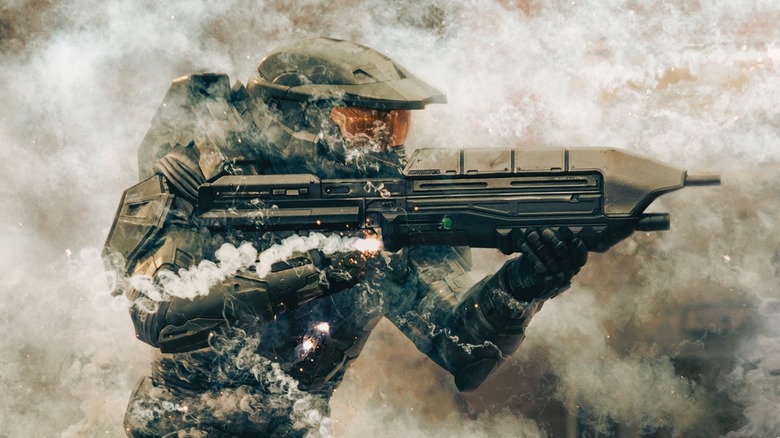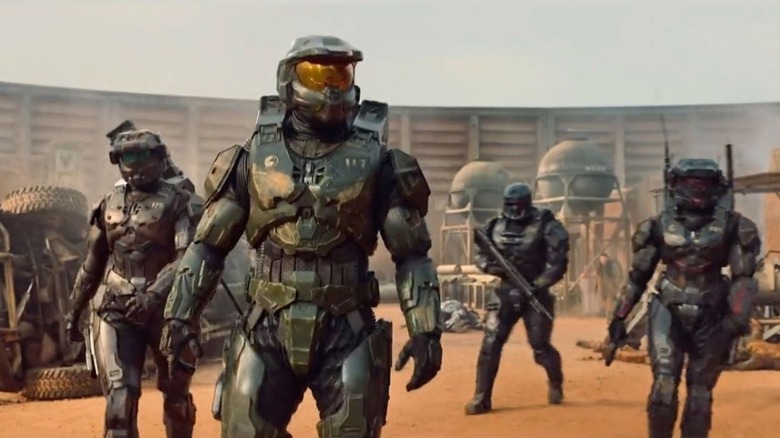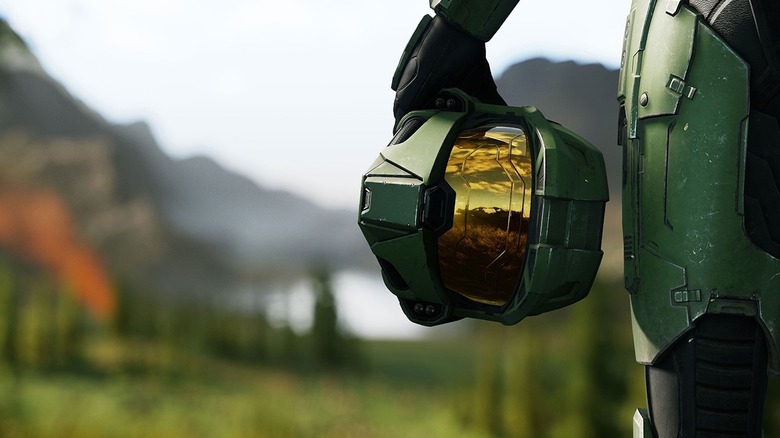How Halo Became A TV Series Instead Of A Movie
As an '80s kid, I grew up with video games. A proud member of the Nintendo generation, I was front and center for the NES, Sega (OG and Genesis), Gameboy, Super Nintendo, N64, and Gamecube run of consoles. Then I kinda left video games behind — not in a conscious "time to grow up now" way, but my priorities just shifted and, honestly, there wasn't a whole lot on offer for me.
When the Xbox first took a bow I was well out of gaming, but I'll never forget being trapped by a winter storm while on vacation and my best friend, Aaron, deciding to rent an Xbox from the local video store to give us something to do in order to wait out the freeze. We spent a couple of days playing "Halo: Combat Evolved" split-screen co-op, culminating in one of the most cinematic finales I've ever experienced, where he was driving an armored car through an exploding arena, racing towards a dropship before the whole damn world blew up while I was eagerly mowing down enemy aliens with a minigun mounted on the back.
"Halo" is what got me back into video games and, for better or worse, I haven't left them since. There have been a hundred better games that have come out in the last 20 years, but I'll never forget that feeling of immersion and involvement that the very first "Halo" gave me; a feeling so strong that it hooked me back into gaming and kept me there for my entire adult life.
A long and winding road.
The road to Microsoft's crown jewel IP hitting live-action has been a long one, full of twists, turns, and dead ends. You may remember Peter Jackson was attached to produce a live-action movie in the aughts with a promising young short film director named Neill Blomkamp. Microsoft bucked the traditional Hollywood development process and instead paid respected writer Alex Garland seven figures to write the movie they wanted and then shopped that around with a no-notes policy attached.
I've read Garland's script and it's awful. It reads like a guy half-watching his young niece or nephew playing through the game while taking vague notes. You could almost feel his embarrassment at writing a "video game movie" come off the page. Microsoft's deal was also so weighted in their favor that their studio partner, at that time Universal, would be footing the bill for the whole thing and getting very little of the profits. Despite "Halo" being the dominant video game title, and Master Chief serving as the face of gaming in much the same way as Mario before him, a film adaptation never managed to happen, even with heavy-hitters like Peter Jackson and, at one point, Guillermo del Toro, tasked to make it happen.
So, why now?
Things are different 20 years later. The whole entertainment world has changed. "Halo" demands a budget. There's no getting around that without totally missing the point of bringing that rich, enormous war-torn world into the live-action space, and previously the only way to guarantee that level of production value was to go through the studio system.
In short, streaming becoming the dominating force in film and TV production changed the metric, and this very moment, where you have all these different studios trying to plant a flag for their piece of land, makes the conditions right for "Halo" finally happening. The money is there (Paramount+ is reportedly spending $10 million per episode), the audience demands higher production quality for their monthly subscription fee and the stigma around a "video game" movie or show is at an all-time low.
Now, this was all just to set the stage for how the "Halo" series worked out on a business level. Creatively, there's a whole other side of how this series came about.
It's less about the game and more about the back story.
Variety has a great, in-depth piece looking at the origins of the Paramount+ show, which debuts March 24, 2022, after 2 years of production. And according to the producers, writers, and actors quoted in the piece, it seems that the biggest draw wasn't the games themselves, but rather the mountains of lore and backstory that have been developed over the years. Yes, a lot of that is in the games themselves, but you also have two decades' worth of novels, comics, and in-house detailing.
In fact, almost every key person interviewed for the piece said they came to "Halo" through this job, not because they were fans of the game first. That's not necessarily a bad thing, mind you. Being a longtime fan doesn't always make you the right person to spearhead an adaptation. Don't believe me? Just go search for some "Star Wars" opinions on YouTube and you'll see a thousand examples proving that knowing all the minutia of a property doesn't mean you understand how storytelling works.
Paramount+ wants to establish themselves beyond their "Star Trek" series, and "Halo" is their big chance at it. Of course, they want to make it long-form. The more hours of "content" there are, the more successful they view their investment. That's just the streaming way. Creatively, the team behind "Halo" was attracted to the lore behind the mysterious series of Ring planets and multiple alien civilizations established in the "Halo" canon.
Is it Master Chief's time to shine?
Season 1 showrunner Steven Kane even went so far as to say they never talked about the game in the early days — it was all about the characters and the world, which might come as a surprise for casual gamers because while the world of "Halo" is gorgeous, the games were always about immersion. As big of a deal as this series was for me, personally, that's certainly the boat I was in. Master Chief is an icon, but he's kind of a blank slate, a mysterious gravely voiced super soldier badass who can kill aliens real good and doesn't love anybody except for his oddly sexy A.I., Cortana. The lead character is designed, in the game at least, to make the player feel powerful and cool, not to tell a deep, complex story like, say, "Bioshock."
So, it was key for the "Halo" producers, both on the Microsoft and on the Paramount+ side, to be willing to separate the game and this series. If they had made a single movie, maybe the visuals of the Spartan armor and exploded alien heads would have been enough, but for a series, they needed to create their own thing, which is what they did. This series is its own spun-off world, in much the same way that the MCU is its own timeline separate from the comics.
Is that going to pay off? Well, I guess we'll see. The early word on the first two episodes is mixed, even from our own Jeremy Mathai, but the final verdict will have to be made once the whole season is out and available. For my part, I can't help but think that the time for a "Halo" adaptation has come and gone, but nothing would make the young gamer in me happier than to be knocked flat by a great adaptation.
"Halo" debuts on Thursday, March 24, 2022, on Paramount+.
